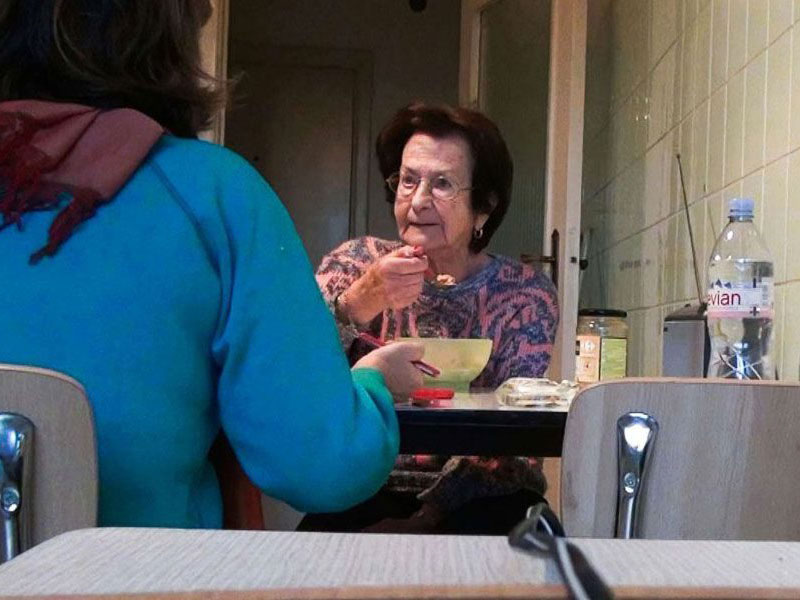
Daniel Kasman: This is not the first film we’ve seen of yours that is about your relationship with your mother. This has been a filmmaking motif for you. Can you say something about its importance, the relationship to your filmmaking practice?
Chantal Akerman: I cannot. I had the feeling for a long time – my mother went into the camps and never said a word about it – that I had to talk for her, which is crazy because you cannot talk for someone else. So I was obsessed by that, by her life. I was obsessed also by the way when she went out of the camps she made her house into a jail. That’s Jeanne Dielman. Now I can tell that, but I was not aware of that when I did it, you know? So I thought that I was the one that had to make, because she would not say anything, that I was the one who was going to testimony instead of her.
But, once, I was in Mexico with her because my niece had her wedding – my sister lives in Mexico – and my film about Conrad, Almayer’s Folly, was screened there, and I went on the stage, I had a Q&A, and my mother was deaf, you know, so she didn’t understand anything. But when we went out, she said, “you have all that, and I had only Auschwitz.” And then I realized that same moment that I could not speak on her behalf, she was the only one who could speak, and if she didn’t want to speak, that should be it.
So, yes, she was a part of my filmmaking, you know I can say it now, because during the whole time when I did News from Home we saw letters and many other things, I was not aware of all that, you know? Now, I’m aware. Now I realize that maybe I took a position or a place that was in a way entering in her territory by refraction. Who knows. It’s complicated.
There were some books that were written about second generation children, and they analyze, saying there are three generations of people who will be hurt after the one that went into the camps. And I’m the first generation, the first girl, the first child in both sides of the family, in my mother’s side and my father’s side after the war. So imagine: I took on my back all the desire to reject them, because I didn’t make any children, I am not married. This is not their desire, their desire is for me to perpetrate. First of all my father wanted a boy, not a girl, of course, because the first one should be a boy, for the name, he told me once. And I didn’t do all that, I did all the other ways from what they wanted. At the same time, they were very proud when they saw... my mother kept all the articles. My father was annoyed because I didn’t make enough money, but he was still very proud.
So I don’t know if I answered your question, because I’m not really able to answer it. It’s a complicated question and it would take hours. But, a lot of things I can say now, and when I was actually doing it, I was totally unaware, you know? It’s more for a historian of cinema to answer your question than for me. Because you ask the filmmaker as if the filmmaker knows a lot about his own work. The filmmaker, a person like me, is the last one to be asked, in a way, you know? Because I don’t embrace my body of work and I don’t have like a point of view from outside, to say, “hey Chantal, you did that and it’s related to your mother, here again, here again, what did that mean and what did you want” – no. I just had an idea and I did it. But then I go to talks, I go to psychoanalysis and I speak about that, so I do understand a little bit. But it really takes an outside point of view and that’s not my work. So I cannot really answer. I think that should be your work.
Daniel Kasman in conversation with Chantal Akerman1

